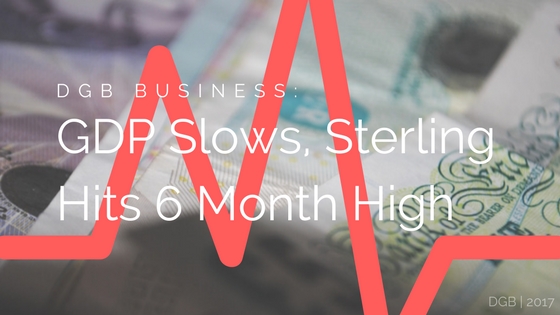The UK’s first quarter GDP figures were announced on Friday and as expected, the growth rate slowed. Q1 GDP growth came in at 0.3% versus an estimated 0.4%. This is down from 0.7% in Q1 of 2016.
Despite the drop, Sterling continued to rise, and finished the week at a 6 month high, edging closer and closer to the psychologically important $1.30. To boot, the Pound versus the Euro finished at just under 1.19. Sterling has retreated slightly since the high of last week, but still posts an impressive percentage gain since the start of the year.
There was a slight dip when the figures were released, but that was quickly recovered and then some. So why didn’t UK currency drop? Is it a sign of the continued resilience in the UK economy?
Drop priced in
It was well telegraphed for quite a while that Q1 GDP figures this year were going to be slower than we have been used to. Inflation has started to rise which was always going to take a pinch out of the spending power of the British public. So any loss in value was priced out weeks ago. Hence the lack of any movement south in the currency.
The markets also saw the snap General Election call as a good sign. Although the FTSE 100 dropped, Sterling rose over three cents on the announcement. According to financial commentary, a bigger majority for Theresa May gives her more stability in Government, and a genuine elected mandate, seen as important when heading into Brexit negotiations. On the back of that Sterling rose, and some economists feel that as we get closer to polling day and if her lead remains at current levels, Sterling may rise further as the outcome appears to be more certain.
But we have seen in recent years how unreliable polls can be. It should be impossible for polls to be 20 points wrong though.
Is it all Brexit?
Some news outlets last Friday were questioning how much Brexit has had on these figures. Yes inflation has risen from it’s lows, and wage growth is around par. It has led to some consumers cutting back on their spending. Something we should be watching out for as an industry. Big ticket items like windows, doors and glazed extensions are often things pushed down the list when it comes to cutting back spending.
However, the underlying economy still shows signs of good strength. So some are arguing that the Q1 GDP figures could just be a small blip in the cycle. Rather that Brexit being the sole cause of the slower growth, it could just be part of the economic cycle.
I would also point out that pre-EU vote, pretty much every think tank and economist had predictions of a recession for the UK immediately afterwards. As it turns out, these predictions were way off the mark. Since then, the UK has seen continuous growth. It’s also worth pointing out that Q1 GDP figures are worked out based on around half of available data. There are two more revisions to make to these figures as we move further into Q2, and as has been done in the past, it is perfectly feasible we could see upward revisions.
It would be silly to think that there was absolutely no Brexit effect. Upwards inflation caused by the drop in Sterling will always have an impact at some point down the line. Exports are booming though, and if you’re in a business that exports, you may not want to see Sterling rise back to pre-EU vote levels all that quickly. We also have to think about the time of year. Q1 GDP figures can sometimes look more depressed in comparison to other quarters as most home owners will spend these months paying off their Christmas credit card debt and getting back into financial health before going to to spend again. It would not surprise me to see Q2 figures bounce back strongly.
Whether this is totally Brexit related or a more generic move in the economic cycle will remain to be seen. A strong election result for May might well see Sterling recover further, dampening inflation and relieving some of the pressure on the UK economy. What remains important however is that we still have growth. It may not be rip-roaring growth, but I’d rather have slow and steady than big swings one way then the next. Some growth is better than no growth at all, and we should be promoting the good stuff now in the face of the variety of recession predictions before the vote took place.
To get weekly updates from DGB sent to your inbox, enter your email address in the space below to subscribe:







